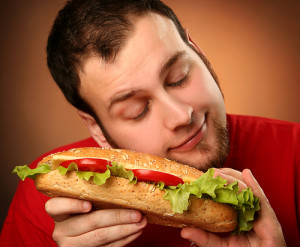 Any addiction promotes an unhealthy lifestyle, but the ones that involve substances, such as a food, alcohol or drug addiction, are some that impose the most immediate threats to the addict. These addictions have rapid biological effects on the addict that change their bodily chemistry for the worse. A food addiction is dangerous and detrimental to the addict, and overcoming it should be a high priority, but how does one bring a food addiction under control? A food addiction is more than just a bad habit. It is a way of life for many people, and a particularly unhealthy way of life.
Any addiction promotes an unhealthy lifestyle, but the ones that involve substances, such as a food, alcohol or drug addiction, are some that impose the most immediate threats to the addict. These addictions have rapid biological effects on the addict that change their bodily chemistry for the worse. A food addiction is dangerous and detrimental to the addict, and overcoming it should be a high priority, but how does one bring a food addiction under control? A food addiction is more than just a bad habit. It is a way of life for many people, and a particularly unhealthy way of life.
Self-help methods, such as addiction literature, work well for mild addictions and for independent people who value teaching themselves. For concerning but less severe addictions, outpatient rehab is a recommended form of treatment, but it is not residential so treatment sessions are shorter and more spread out. For extreme food addictions that are putting the addict in danger, inpatient rehab is highly recommended. This form of live-in, concentrated addiction treatment is the most intensive, aggressive and effective means of ending any addiction, and inpatient rehab programs that specialize in food addiction and eating disorders are available.
In order to beat any addiction, including food addiction, a particular key to success lies in filling your time with meaningful activities, hobbies, purposes and goals. Having a life of meaning will inspire a food addict to make a full recovery through the desire to experience and embrace life at its fullest.
In times of weakness when you feel in danger of relapsing or binging, turning to members of your support system for encouragement can make the difference between success and failure. Pulling your support system close to you is vital when recovering from a food addiction. This may be your friends, family or a food addiction support group that you have sought out. People you are close to and trust will be an important asset to your food addiction recovery.
